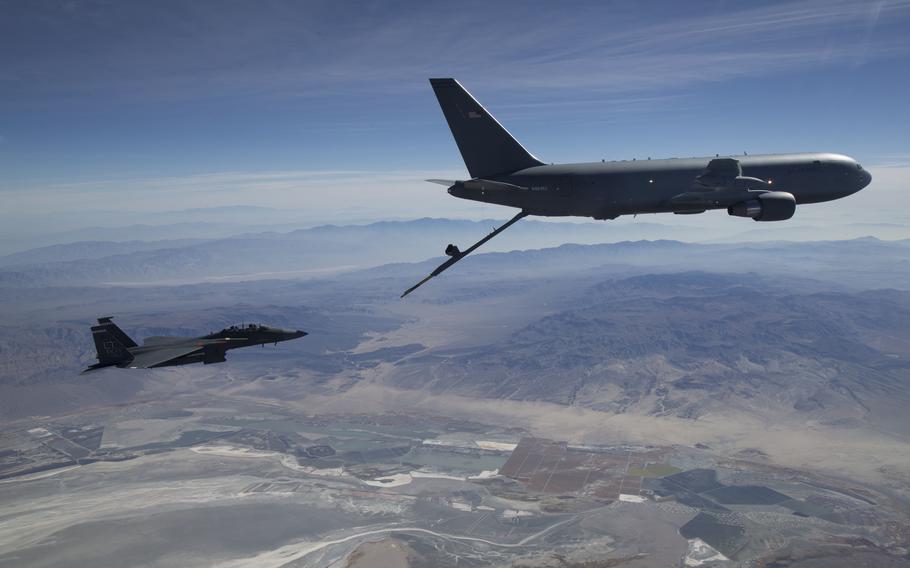
A KC-46A Pegasus aerial refueling aircraft connects with an F-15 Strike Eagle test aircraft from Eglin Air Force Base, Fla, on Oct. 29, 2018. The 418th Flight Test Squadron is conducting refueling tests with the fighter at Edwards Air Force Base, Calif. (Michael Jackson/U.S. Air Force)
It’s been a challenging period for many aerospace manufacturers. The COVID-19 pandemic, along with fluctuations in commercial production and labor shortages, has set many businesses back. Rising prices and shortages of raw material have increased manufacturing costs significantly, particularly in our industry.
Inflation is especially difficult for business owners, and it is disproportionately impacting aerospace suppliers. The price of raw materials used to build an aircraft has increased to an unsustainable level. For example, aluminum – it is one of the main components of a modern aircraft because it is lightweight and durable. According to data from the World Bank, the average price of aluminum rose 62% from October 2020 to October 2021. Steel, another crucial raw component in aircraft manufacturing, saw its trading price rise from $500 in March 2020 to $1,750 in June 2022. Price increases of materials across the board, including titanium, composite materials and tempered glass, have put a strain on businesses.
As the president of Ran-Tech Engineering & Aerospace Inc. I can say with confidence that the longer this type of inflation continues, the more precarious American manufacturing will become. That’s bad for the economy and our country’s defense strategy.
Our company produces sheet-metal and precision machined parts and assemblies. Our products are used to manufacture the KC-46 Pegasus, a refueling tanker utilized by the U.S. Air Force.
Despite the mounting challenges of today’s economy, I’m proud to say that thanks to our incredible team, we’ve been able to maintain our rigorous standards and reliably deliver high-quality products to our customers. In fact, supply companies across the country have risen to the occasion to ensure that the KC-46 tanker program continued without compromised quality.
In this current climate, issues with maintenance and long-term sustainment planning are happening across the industry. Regarding aircraft manufacturing, there have also been reports of spare parts shortages. These issues are even more challenging now thanks to ongoing inflation.
American supply companies supporting the KC-46 tanker have continued working hard to help ensure the Air Force has what it needs to maintain the program and enable our warfighters. Our goal is to provide the parts that will sustain the tanker’s critical mission long-term and cement its place as the refueler the Air Force relies upon as it moves forward in its recapitalization efforts.
The Pentagon and Congress are considering adding a different type of tanker to the American fleet. Discussions about acquiring the European-made MRTT tanker are in progress, but mixing the fleet would be a mistake for our military and for small businesses like ours.
Will Roper, who was the former head of USAF acquisitions, said that “having domestic supply is a strategic strength. And one that the [Department of Defense] – the nation – needs to think about more critically, what it’s willing to trust overseas sources for.”
Incorporating a foreign tanker into the American fleet would not only take business away from American companies like mine, it would also cost American jobs and permanently install insecurity into the supply chain. The Air Force would be at the mercy of foreign entities for spare parts and on-time deliveries overseas, and it would have to navigate delicate diplomatic relations to sustain the program.
Rather than taking on the burdens of potential supply chain breakdowns, export restrictions, international disagreements, and domestic job losses, the Air Force should focus on building upon a proven model that works.
There are enough challenges facing American companies right now. Maintaining and investing in an American-made refueling tanker reduces risk, bolsters American companies and workers, and provides an added layer of security for national defense and program sustainment.
Bill Cusick is president of Ran-Tech Engineering & Aerospace Inc. in Clackamas, Ore.